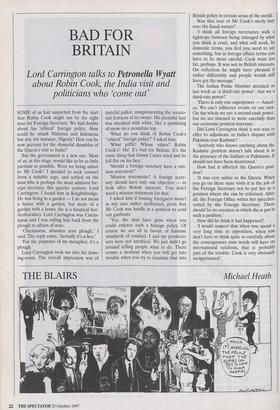BAD FOR BRITAIN
Lord Carrington talks to Petronella Wyatt
about Robin Cook, the India visit and politicians who 'come out'
SOME of us had suspected from the start that Robin Cook might not be the right man for Foreign Secretary. We had doubts about his 'ethical' foreign policy. How could he attack Malaysia and Indonesia but not, for instance, Nigeria? How can he now account for the shameful shambles of the Queen's visit to India?
But the government is a new one. Most of us, at this stage, would like to be as little partisan as possible. Were we being unfair to Mr Cook? I decided to seek counsel from a suitable sage, and settled on the man who is perhaps the most admired for- eign secretary this quarter century: Lord Carrington. I found him in Knightsbridge. He was living in a garden — I do not mean a house with a garden, but more of a garden with a house (he is a fanatical hor- ticulturalist). Lord Carrington was Cincin- natus and I was calling him back from the plough to affairs of state.
`Cincinnatus, abandon your plough,' I said. The reply came, 'Actually it's a hoe.'
`For the purposes of my metaphor, it's a plough.'
Lord Carrington took me into his draw- ing-room. The overall impression was of tasteful pallor, complementing the senato- rial features of its owner. His plentiful hair was streaked with white, like a sprinkling of snow on a mountain top.
`What do you think of Robin Cook's "ethical" foreign policy?' I asked him.
`What piffle! Whose ethics? Robin Cook's? Ha! It's bad for Britain. It's the same thing that Jimmy Carter tried and he fell flat on his face.'
`Should a foreign secretary have a mis- sion statement?'
`Mission statements? A foreign secre- tary should have only one objective — to look after British interests. You don't need a mission statement for that.'
I asked him if bossing foreigners wasn't in any case rather ineffectual, given that Mr Cook was hardly in a position to send out gunboats.
`Yes, the days have gone when you could enforce such a foreign policy. Of course we are all in favour of humane standards of conduct. I and my predeces- sors were not unethical. We just didn't go around telling people what to do. There comes a moment when you will get into trouble when you try to translate that into British policy in certain areas of the world.' Was that true of Mr Cook's steely fury over the Saudi nurses?
`I think all foreign secretaries walk a tightrope between being outraged by what you think is cruel, and what will work. In domestic terms, you feel you need to say something, but in foreign affairs terms you have to be more careful. Cook went too far, perhaps. It was not in British interests. On reflection he might have phrased it rather differently and people would still have got the message.'
The Indian Prime Minister attacked us last week as 'a third-rate power'. Are we a third-rate power?
`There is only one superpower — Ameri- ca. We can't influence events on our own. On the whole we are a second-rank power, but we are listened to more carefully than our economic position warrants.'
Did Lord Carrington think it was wise to offer to adjudicate in India's dispute with Pakistan over Kashmir?
`Anybody who knows anything about the Kashmir problem doesn't talk about it in the presence of the Indians or Pakistanis. It should not have been mentioned.'
How had it affected the Queen's posi- tion?
`It was very unfair to the Queen. When you go on these state visits it is the job of the Foreign Secretary not to put her in a position where she can be criticised. After all, the Foreign Office writes her speeches, vetted by the Foreign Secretary. There should be no occasion in which she is put in such a position.'
How did he think it had happened?
I would suspect that when you spend a very long time in opposition, when you don't have to think quite so carefully about the consequences your words will have on international relations, that is probably part of the trouble. Cook is very obviously inexperienced.' What would Talleyrand have thought of Robin Cook?
Lord Carrington rocked to and fro like a Russian doll. 'Indeed! Or what would Bis- marck have thought? I don't think Palmer- ston would have had a high opinion of this sort of foreign policy either. Not that any of these people were amoral.' Wasn't it true, however, that the general public in this country assumed that diplo- mats were amoral — greasy Widmerpools gathering in the good life, not to mention the bribes, as a croupier rakes in the chips?
`Yes, people think we are traitors on champagne — champagne traitors! Actu- ally a diplomat's life can be very dull and rather fraught.' He recounted a story of a dinner in honour of Khrushchev at the Painted Hall in Greenwich. After glancing at his neighbour's name-card Lord Car- rington remarked, 'I imagine you are at the Russian Embassy, Mr Brimelov?' The reply came, 'My name is Brimelow. My family has lived in Worcestershire for a thousand years, and I am in the Foreign Office.'
`I bet he never forgave you for that.' `No, he never did.'
Lord Carrington was born into a wealthy family of tradesmen ennobled in the 18th century. Given his advantages, why did he bother to go into politics? `I went into politics because of the war. The suffering made one determined to ensure, as far as one could, that it didn't happen again. I had had a sheltered upbringing, as people of my class did, and when I saw so many unemployed through no fault of their own I wanted to do some- thing.'
Was this the origin of the Wets, of whom Lord Carrington was a leading member, along with Lords Prior and Whitelaw?
`Yes, it was. We were wrong, though. We thought unemployment was the worst thing that could ever happen to people. But what we didn't realise was that howev- er awful unemployment was morally, it didn't mean in the 1970s the same depriva- tion and hardship that it did in the 1930s.' Had he, as it were, dried out? I still don't approve of hard-faced Con- servatism. If the Tories now were to become more ideological I think it would be more difficult for them to get in again.' Lord Carrington resigned in 1982 after the outbreak of the Falklands war. He said it was 'the most sorrowful moment of my life, but the nation feels that there has been a disgrace. Someone must have been to blame. The disgrace must be purged.' I remarked that I could not envisage many politicians saying that now. Politicians do cling to office today. It is all much more careerist. They are not Inclined to accept blame. In my day per- haps it was easier to have a sense of public service because more politicians had a pri- vate income.' Had he ever regretted resigning?
`No, never. Actually, I was wrong not to resign at the time of Crichel Down.' (Crichel Down was a piece of land in Dorset that had been acquired by the gov- ernment in the 1930s. An inquiry con- demned Carrington's department for acting arbitrarily in not allowing the origi- nal landowners the chance to repurchase.) Who were his political heroes? 'I'm afraid I rather like Harold Macmillan.' Wasn't he a bogus charlatan who helped ruin Britain? 'He was an actor, but I don't think that is such a bad thing. He used to come here to dine and say, hanging over the gate, "How nice to visit the trades- man's cottage." ' `Wasn't that very rude of him?' `Well, when my ancestor was ennobled the whole of the House of Lords walked out in protest because he was a banker. That was very rude, considering most of them were descended from bastards. Now bankers are quite respectable — or some are.'
What did he think was wrong with mod- ern Britain?
`Oh dear. I hate words like "modernisa- tion" and "the people". What do they mean? Take the Princess of Wales's death. Why must we all bang our heads against a wall in public? As a race we appear to have lost all reticence. We love displaying ourselves come what may. This business of politicians talking about their sexual incli- nations — Chris Smith, for instance — is very unattractive. Of course one knew politicians who were homosexual, but they never came out and said they fancied Ted Heath.'
What did he think of spin doctors?
`I think the government must be very careful with that. The politicisation of the civil service would be very bad for the country. Spin doctors didn't exist in my day. Speeches were never leaked before they were made, or given a different interpretation. I sometimes wonder why people bother to make the speeches at all. Poor Gordon Brown has now got himself into a very difficult position over EMU. The government had better clarify its views.'
Would he like to return to public life? I urged Lord Carrington to come back into political existence to redress the balance of new Britain. He narrowed his lucent eyes.
`No thank you, young woman. I'm happy in my garden.'
I took my leave of him at the gate over which Macmillan used to hang, past soft hillocks of grass and bags bursting with fer- tiliser, over paving-stones worn down by the tread of past statesmen. As I glanced back, Cincinnatus was quietly tending his soil.



















































































 Previous page
Previous page